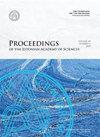护生心理健康护理模拟训练中的情绪应对
IF 1
4区 综合性期刊
Q3 MULTIDISCIPLINARY SCIENCES
引用次数: 0
摘要
. 在心理健康护理中进行模拟训练的过程是一种教学方法的一部分,用于增加学生对精神疾病的理解,使他们能够发展所需的移情实践,这将成为他们技能的一部分。模拟训练已被证明是护理课程中一种有效的教学方法。模拟培训有助于在与患有精神健康障碍的患者交流时减轻社会耻辱感和普遍的恐惧和焦虑。本研究的目的是研究在心理健康模拟训练的背景下可能产生的学生情绪和感受。本研究以在某卫生学院进行心理健康模拟训练的心理健康专业本科护生为研究对象。基于学生自我反思的过程,采用定性内容分析分析学生反馈。分析的重点是学生在学习过程中产生的情绪,以及学生采用的情绪管理过程。研究结果证实了学生在心理健康模拟训练中经历了情绪紧张的假设。根据分析结果,可以设计一个模型,该模型将在心理健康模拟训练期间提供所需的情感准备和支持。这包括一系列建议,这些建议将有助于正在进行模拟训练的学生的情感准备。本文章由计算机程序翻译,如有差异,请以英文原文为准。
Emotional coping of nursing students during mental health nursing simulation training
. The process of carrying out simulation training within mental health nursing is part of a teaching method used to increase a student’s understanding of mental illness, allowing them to develop the required empathic practices that will form part of their skillset. Simulation training has proven to be an effective teaching method within the nursing curriculum. Simulation training provides assistance in the alleviation of societal stigma and general fear and anxiety when communicating with patients who have mental health disorders. The aim of this research is to study student emotions and feelings that may have arisen within the context of mental health simulation training. The current research was conducted by making use of a cohort of undergraduate nursing students in the field of mental health who were undertaking mental health simulation training in a healthcare college. Student feedback was analysed using qualitative content analysis, based on a process of self-reflection by the students themselves. The analysis focused on emotions that had arisen during the study process, and emotional management processes that had been adopted by the students. The results of the research confirmed the supposition that the students had undergone emotional tension during mental health simulation training. Based on the results of the analysis, a model could be designed, which would provide the required emotional preparation and support during a mental health simulation training. This consists of a series of recommendations, which will assist in the emotional preparation of students who are undertaking simulation training.
求助全文
通过发布文献求助,成功后即可免费获取论文全文。
去求助
来源期刊

Proceedings of the Estonian Academy of Sciences
综合性期刊-综合性期刊
CiteScore
1.80
自引率
22.20%
发文量
24
审稿时长
>12 weeks
期刊介绍:
The Proceedings of the Estonian Academy of Sciences is an international scientific open access journal published by the Estonian Academy of Sciences in collaboration with the University of Tartu, Tallinn University of Technology, Tallinn University, and the Estonian University of Life Sciences.
The journal publishes primary research and review papers in the English language. All articles are provided with short Estonian summaries.
All papers to be published in the journal are peer reviewed internationally.
The journal is open to word-wide scientific community for publications in all fields of science represented at the Estonian Academy of Sciences and having certain connection with our part of the world, North Europe and the Baltic area in particular.
 求助内容:
求助内容: 应助结果提醒方式:
应助结果提醒方式:


